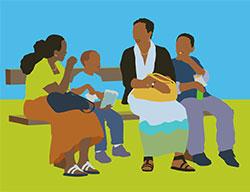Black History Month is an opportunity to spotlight and celebrate the achievements that African Americans have accomplished in this country, despite the history of racism and oppression. Continued engagement with history is vital because it helps give context to where we are and where we are going. Recognizing this month-long observance provides a reminder to us all that we must be the change we want to see in this world.
In choosing to honor this observance, the Health Care Authority is choosing to celebrate diversity while acknowledging that there is beauty in unity. Celebrating Black History Month helps us to recognize and be deliberate in working to understand the significance of everyone’s personal stories and lived experiences.
So, what does Health Equity mean to you? In honor of the 2024 Black History Month national theme, “African Americans and the Arts” the Health Care Authority is exploring what health equity looks like to people across our state.
A showcase of health equity: in words, in art.
Shauna – HCA Multi-Ethnic Employee Resource Group (ERG) lead
“To me, health equity looks like being able to receive quality health care by practitioners who look like me and are familiar with my specific health care needs.”

Gloria – Apple Health client
“To me, health equity looks like comfort! The comfort of knowing that if something happens, I can get the care I need.”

Cheryl – PEBB retiree
“To me, health equity looks like having health care providers who listen to me and believe what I’m saying about my health concerns. Not assuming, because of my ethnicity, age, or gender that I am exaggerating, or that ‘it’s all in my head’.”

Natalia – HCA Apple Health employee
“Growing up as a Medicaid kid was tough. As an adult working for Apple Health, I love that I can help make our policies and procedures more inclusive and create greater access to care for everyone who relies on HCA for health coverage. That is what health equity looks like to me!”

Dr. Ashli Owen – HCA stakeholder
“In my mind, health equity is achieving the highest level of health for each person.”

Britny Bock – National Institutes of Health (NIH) clinical stakeholder
“Health equity is ensuring that everybody has access to the same level of care, while taking into consideration that available resources may vary.”

Lyquettia – HCA medical assistance employee
“For me, as a Black woman, health equity means having access to high-quality health care that is culturally sensitive, affordable, and free from discrimination.”

Mike Matheny – HCA employee and ally
“To me, health equity is achieved when a community has the opportunity to reach their full health potential and are not disadvantaged due to their socially determined circumstances.”

Robin – HCA employee resources director
“To me, health equity means that all the children in my community have the same access to care, the same quality of care, the same safety, and the same access to green spaces and public health support. Health equity means everyone has the same chance to live a healthy life, starting from childhood.”

Ashley – HCA health equity program manager
“To me, health equity means acknowledging harms done in the past, correcting those harms through equitable policies, programs, and services that address the needs of communities most impacted by former inequitable practices so that they can have the best chance to be healthy and happy.”

Mareco – HCA supervisor
“As a Black male in the United States of America, health equity holds a deeply significant and personal relevance. Ideally, health equity for Black males today should resemble a society where individuals of all races, including Black men, have equal access to health care, resources, and opportunities that promote their overall well-being.
The contrast between health equity for Black males then and now reflects the progress and ongoing challenges in achieving equitable health outcomes for Black men in the United States. However, while there have been advancements, systemic barriers and disparities persist. We need to continue to highlight the need for concerted efforts to achieve true health equity for all. To me, health equity is witnessing and experiencing those concerted efforts.”

Resources
- NIMHD Envisioning Health Equity Art Challenge | National Institute of Health
- Health equity | Washington State Health Care Authority
- Policy No. 3-57: Pro-Equity Anti-Racism (PEAR) Implementation, Roles, & Responsibilities | Washington State Health Care Authority
- Health Equity | Washington State Department of Health
- Visualize Health Equity | National Academy of Medicine
